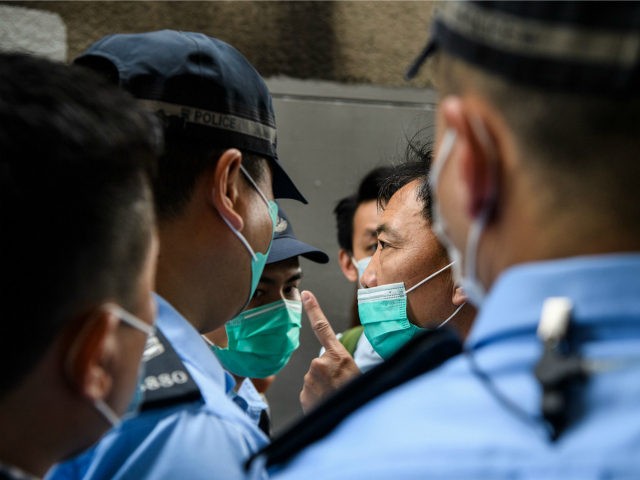Chinese police whisked Xu Zhangrun out of his home on Monday after years of writing scathing critiques of dictator Xi Jinping, reports alleged, and shortly after police began calling his wife and claiming he was soliciting prostitutes.
Chinese police do not appear to have confirmed the arrest at press time, so there is no indication of what crimes he is being accused of to take him into custody. In addition to the South China Morning Post‘s claim that Xu’s wife had received bizarre police calls alleging ties to prostitution, Xu may face charges of “picking quarrels and provoking trouble,” a catch-all Chinese Communist Party crime for anyone who questions the regime.
Xu has been writing extensive essays for years accusing Xi – who graduated from Beijing’s Tsinghua University, where Xu taught before being suspended for criticism of the Communist Party – of “betrayal” of the Chinese people for walking back the economic reforms pioneered by predecessor Deng Xiaoping, which allowed Chinese people to own private property and created Chinese Communist Party-sponsored millionaires but maintained the murderous policies against dissidents imposed by Mao Zedong. Xu has called for term limits to keep Xi from ruling in perpetuity and, more recently, condemned Xi’s leadership during the Chinese coronavirus pandemic.
Xu also called for the country to honor Li Wenliang, a Wuhan doctor who died, allegedly of Chinese coronavirus, shortly after police arrested him for posting infectious disease safety tips on WeChat, a Chinese-controlled social media outlet.
Agence France-Presse (AFP) reported that police took Xu out of his home in the early morning hours of Monday, Beijing time, citing unnamed friends of the professor. The communist regime allegedly sent more than 20 officers to apprehend Xu. No reports have surfaced that Xu resisted or evidence that he would have posed enough of a threat to armed police that such a large deployment was necessary, but some reports indicated that the large team was also there to seize Xu’s writings, computers, and mobile devices, presumably to find any more anti-communist content.
“We heard that a lot of police came this morning and they came in about 10 cars. We don’t know why he was taken away this time,” an anonymous “friend” told the South China Morning Post. “I’ve urged Xu to hire a lawyer since he was suspended [by the university] after his last run-in with the authorities, and we were worried about his safety. But he said he doesn’t need one because he was a lawyer himself.”
The Post did quote the prostitution rumor on the record. Another writer and friend of Xu’s, Wang Bin, told the newspaper that police called Xu’s wife and said that, upon a visit to southern Chengdu city, Xu had solicited prostitutes. There is no evidence that the case is true and an anonymous friend quoted in AFP called the allegation “ridiculous.”
Xu rose to international prominence in 2018, as protests spread throughout China against the government for allowing Party-approved pharmaceutical companies to inject an excess of a million children with faulty vaccines, watered down to generate more profit but not actually inoculating children from diseases. That year, Xu published an extensive essay calling for term limits and an expanded respect for private property, among other reforms, that many interpreted as a vocal condemnation of Xi.
“Over the past decades, civil society has not evolved in China. Whenever there’s been an outbreak of anything approaching normalcy, it has been crushed,” Xu lamented.
“In recent years, the gunpowder-like stench of militant ideology has become stronger,” he noted later in the piece. “We are even seeing examples of official propaganda in which children are encouraged to report on their parents, in flagrant violation of normal ethical relations. Such an approach is a betrayal both of our traditions and of our present aspirations.”
Xu also dared to challenge Xi’s flagship policy proposal, the Belt and Road Initiative (BRI), an ambitious plan for China to build all the world’s most important roads, ports, and railways and use them to impose Communist Party law on foreign countries.
“Why is China, a country with over one hundred million people who are still living below the poverty line, playing at being the flashy big-spender?” Xu asked. “How can the Chinese not comment in astonishment: just what is the Supreme Bureaucratic Authority thinking?”
Tsinghua University suspended Xu last year from teaching duties and organized a “work team” to investigate his behavior. He has not been allowed to return to teaching students since. He kept writing, however, criticizing Xi’s lackluster response to the Chinese coronavirus pandemic in February.
“When the pandemic struck, it exposed that China had remained a petty civilisation and a spiritual dwarf [among the world of nations],” Xu wrote. “We are so poor in terms of our political culture and hence our political system is incapable of resolving our political problems.”
The essay criticized President Donald Trump but reserved its toughest blows for Xi’s government, demanding “political reform” away from everything Xi has done while in power. Xu also urged the establishment of a “Li Wenliang Day” to honor the doctor who died after his brutal arrest for sharing medical information online.
Following the essay published in February, Beijing reportedly put Xu under “close surveillance” but had not yet arrested him.

COMMENTS
Please let us know if you're having issues with commenting.